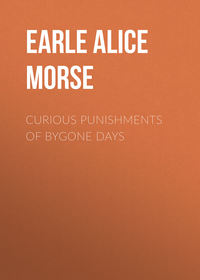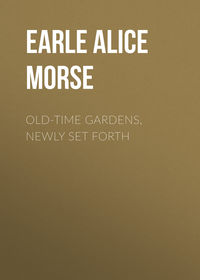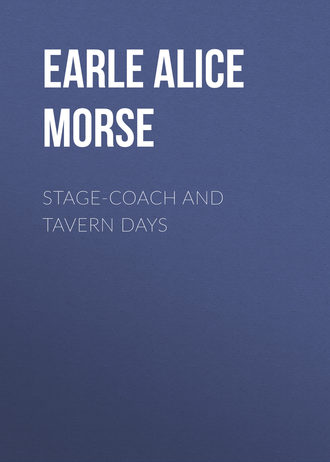 полная версия
полная версияПолная версия
Stage-coach and Tavern Days
CHAPTER III
THE TAVERN LANDLORD
The landlord of colonial days may not have been the greatest man in town, but he was certainly the best-known, often the most popular, and ever the most picturesque and cheerful figure. Travellers did not fail to note him and his virtues in their accounts of their sojourns. In 1686 a gossiping London bookseller and author, named John Dunton, made a cheerful visit to Boston. He did not omit to pay tribute in his story of colonial life to colonial landlords. He thus pictures George Monk, the landlord of the Blue Anchor of Boston: —
“A person so remarkable that, had I not been acquainted with him, it would be a hard matter to make any New England man believe I had been in Boston; for there was no one house in all the town more noted, or where a man might meet with better accommodation. Besides, he was a brisk and jolly man, whose conversation was coveted by all his guests as the life and spirit of the company.”
This picture of an old-time publican seems more suited to English atmosphere than to the stern air of New England Puritanism.
Grave and respectable citizens were chosen to keep the early ordinaries and sell liquor. The first “house of intertainment” at Cambridge, Massachusetts, was kept by a deacon of the church, afterward Steward of Harvard College. The first license in that town to sell wine and strong water was to Nicholas Danforth, a selectman, and Representative to the General Court. In the Plymouth Colony Mr. William Collier and Mr. Constant Southworth, one of the honored Deputies, sold wine to their neighbors. These sober and discreet citizens were men of ample means, who took the duty of wine-selling to aid the colony rather than their own incomes.
The first ordinary in the town of Duxbury was kept by one Francis Sprague, said by a local chronicler to be of “ardent temperament.” His license was granted October 1, 1638, “to keep a victualling on Duxburrow side.” His ardent temperament shaped him into a somewhat gay reveller, and his license was withdrawn. It was regranted and again recalled in 1666. His son succeeded him, another jovial fellow. Duxbury folk were circumspect and sober, and desired innkeepers of cooler blood. Mr. Seabury, one of the tavern inspectors, was granted in 1678 “to sell liquors unto such sober-minded neighbours as hee shall thinke meet; soe as hee sell not lesse than the quantie of a gallon att a tyme to one pson, and not in smaller quantities by retaile to the occationing of drunkeness.”
The license to sell liquor and keep a tavern explained clearly the limitations placed on a tavern-keeper. The one given the Andover landlord in 1692 ran thus: —
“The Condition of this Obligation is sent. That Whereas the above said William Chandler is admitted and allowed by their Majesties’ Justices at a General Sessions of the Peace to keep a common Home of Entertainment and to use common selling of Ale, Beer, Syder, etc., till the General Session of Peace next, in the now-Dwelling house of said Chandler in Andover, commonly known by the sign of the Horse Shoe and no other, if therefore the said William Chandler, during the time of keeping a Publick House shall not permit, suffer, or have any playing at Dice, Cards, Tables, Quoits, Loggets, Bowls, Ninepins, Billiards, or any other unlawful Game or Games in his House, yard, Garden, or Backside, nor shall suffer to be or remain in his House any person or persons not being of his own family upon Saturday nights after it is Dark, nor any time on the Sabbath Day or Evening after the Sabbath, nor shall suffer any person to lodge or stay in his House above one Day or Night, but such whose Name and Surname he shall deliver to some one of the Selectmen or Constables or some one of the Officers of the Town, unless they be such as he very well knoweth, and will answer for his or their forthcoming: nor shall sell any Wine or Liquors to any Indians or Negroes nor suffer any apprentices or servants or any other persons to remain in his house tippling or drinking after nine of the Clock in the night time; nor buy or take to Pawn any stolen goods, nor willingly Harbor in his said House, Barn, Stable, or Otherwhere any Rogues, Vagabonds, Thieves, nor other notorious offenders whatsoever, nor shall suffer any person or persons to sell or utter any ale, beer, syder, etc., by Deputation or by colour of this License, and also keep the true assize and measure in his Pots, Bread and otherwise in uttering of ale, beer, syder, rum, wine, &c., and the same sell by sealed measure. And in his said house shall and do use and maintain good order and Rule: Then this present Obligation to be either void, or else to stand in full Force, Power, and Virtue.”
Dr. Dwight in his Travels said that Englishmen often laughed at the fact that inns in New England were kept by men of consequence. He says: —
“Our ancestors considered the inn a place where corruption might naturally arise and easily spread; also as a place where travellers must trust themselves, their horses, baggage, and money, and where women must not be subjected to disagreeable experiences. To provide for safety and comfort and against danger and mischief they took particular pains in their laws to prevent inns from being kept by unprincipled or worthless men. Every innkeeper in Connecticut must be recommended by the selectmen and civil authorities, constables and grand jurors of the town in which he resides, and then licensed at the discretion of the Court of Common Pleas. It was substantially the same in Massachusetts and New Hampshire.”
Lieutenant Francis Hall, travelling through America in 1817, wrote: —
“The innkeepers of America are in most villages what we call vulgarly, topping men – field officers of militia, with good farms attached to their taverns, so that they are apt to think what, perhaps, in a newly settled country is not very wide of the truth, that travellers rather receive than confer a favour by being accommodated at their houses. The daughters of the host officiate at tea and breakfast and generally wait at dinner.”
An English traveller who visited this country shortly after the Revolution speaks in no uncertain terms of “the uncomplying temper of the landlords of the country inns in America.” Another adds this testimony: —
“They will not bear the treatment we too often give ours at home. They feel themselves in some degree independent of travellers, as all of them have other occupations to follow; nor will they put themselves into a bustle on your account; but with good language, they are very civil, and will accommodate you as well as they can.”
Brissot comprehended the reason for this appearance of independence; he wrote in 1788: —
“You will not go into one without meeting neatness, decency, and dignity. The table is served by a maiden well-dressed and pretty; by a pleasant mother whose age has not effaced the agreeableness of her features; and by men who have that air of respectability which is inspired by the idea of equality, and are not ignoble and base like the greater part of our own tavern-keepers.”
Captain Basil Hall, a much-quoted English traveller who came to America in 1827, designated a Salem landlord as the person who most pleased him in his extended visit. Sad to say he gives neither the name of the tavern nor the host who was “so devoid of prejudice, so willing to take all matters on their favourable side, so well informed about everything in his own and other countries, so ready to impart his knowledge to others; had such mirthfulness of fancy, such genuine heartiness of good-humour,” etc.
In 1828 a series of very instructive and entertaining letters on the United States was published under the title, Notions of the Americans. They are accredited to James Fenimore Cooper, and were addressed to various foreigners of distinction. The travels took place in 1824, at the same time as the visit of Lafayette, and frequently in his company. Naturally inns, hotels, and modes of travel receive much attention. He speaks thus lucidly and pleasantly of the landlords: —
“The innkeeper of Old England and the innkeeper of New England form the very extremes of their class. The former is obsequious to the rich; the other unmoved and often apparently cold. The first seems to calculate at a glance the amount of profit you are likely to leave behind you, while his opposite appears to calculate only in what manner he can most contribute to your comfort without materially impairing his own… He is often a magistrate, the chief of a battalion of militia or even a member of a state legislature. He is almost always a man of character, for it is difficult for any other to obtain a license to exercise the calling.”
John Adams thus described the host and hostess of the Ipswich Inn: —
“Landlord and landlady are some of the grandest people alive, landlady is the great-granddaughter of Governor Endicott and has all the notions of high family that you find in the Winslows, Hutchinsons, Quincys, Saltonstalls, Chandlers, Otises, Learneds, and as you might find with more propriety in the Winthrops. As to landlord, he is as happy and as big, as proud, as conceited, as any nobleman in England, always calm and good-natured and lazy, but the contemplation of his farm and his sons, his house and pasture and cows, his sound judgment as he thinks, and his great holiness as well as that of his wife, keep him as erect in his thoughts as a noble or a prince.”
The curiosity and inquisitiveness of many landlords was a standing jest.
“I have heard Dr. Franklin relate with great pleasantry,” said one of his friends, “that in travelling when he was young, the first step he took for his tranquillity and to obtain immediate attention at the inns, was to anticipate inquiry by saying, ‘My name is Benjamin Franklin. I was born in Boston. I am a printer by profession, am travelling to Philadelphia, shall have to return at such a time, and have no news. Now, what can you give me for dinner?’”
The landlord was usually a politician, sometimes a rank demagogue. He often held public office, was selectman, road commissioner, tax assessor, tax collector, constable, or town moderator; occasionally he performed all these duties. John Adams wrote bitterly that at public houses men sat drinking heavily while “plotting with the landlord to get him at the next town-meeting an election either for selectman or representative.”
They were most frequently soldiers, either officers in the militia or brave fighters who had served in the army. It was a favorite calling for Revolutionary soldiers who lived till times of peace. They were usually cheerful men; a gloomy landlord made customers disappear like flowers before a frost. And these cheery hosts were fond of practical jokes.
One of the old hotels with the long piazza across the entire front was owned by a jesting landlord who never failed to spring an April-fool joke on his forgetful customers each year. The tavern had two doors, and every winter these were protected by portable storm porches the width of the door and about four feet deep. On the first day of April the landlord moved the porches a few feet down the piazza, so they opened upon the blank wall of the house. The house and piazza sat at such an angle with the walk from the street that the uncovered front doors were not visible to the visitor, so the delusion was complete. Grocerymen, butchers, bakers, travellers, even the tavern servants, invariably fell into the trap, thrust open the door, which swung with a slam and left them facing the blank wall. Any tavern frequenter, caught early in the day, was always ready to tole in a group of victims. As they walked up the steps he would say, “Come, boys, let’s all pile into the office in a bunch and holler, ‘Hullo, old Jed,’ all together.” All agreed and charged with a rush into the 4 x 6 storm box, while the plotter of the trick went in the real door and sat coolly sipping a rum punch as the confused and angry contingent came in with battered hats and bruised elbows, after its scuffle in the trap.
One landlord had the name of frequently tricking travellers who stopped for a single meal by having the driver call out “Stage is ready” before they could eat the dinner they had ordered and paid for. A Yankee passenger disregarded this hasty summons and leisurely ate his dinner while the stage drove off without him. He finished the roast and called at last for a bowl of bread and milk to top off with as dessert. Not a spoon could be found for this dish, though plenty of silver spoons had been on the table when the stage stopped. To the distracted landlord the Yankee drawled out, “Do you think them passengers was going away without something for their money? I could p’int out the man that took them spoons.” A stable boy on a fleet horse was promptly despatched after the stage, and overtook it two miles down the road. A low-spoken explanation and request to the driver caused him to turn quickly around and drive back to the tavern door with all the angry protesting passengers. The excited landlord called out to the Yankee as the coach stopped, “You just p’int out the man that took them spoons.” – “Sartainly, Squire,” said he, as he climbed into the coach, “I’ll p’int him out. I took ’em myself. You’ll find ’em all in the big coffee pot on the table. Hurry up, driver, I’ve had my dinner. All aboard.”
Grant Thorburn quaintly tells of this custom at another tavern: —
“At Providence coaches were ready: on flew through the dust and sweat of the day like Jehus. At the tavern dinner was ready, but there was no contract for time to eat; after grace from Dr. Cox (too long for the occasion) we begun to eat. Scarcely had I swallowed half my first course when in came driver hallowing “All ready.” I thought there was a stable-yard understanding between him and the landlord, for while we were brushing the dust from our clothes, mustering and saying grace, he was eating and drinking as fast as he could, and I did not observe that he paid anything. We arrived at the Eagle Tavern (Boston) about sundown; the ladies’ hats and frocks which had shewed colours enough to have decked fifteen rainbows were now one, viz.: ashes on ashes and dust on dust.”
The graceless modern reader might suspect that the “stable-yard understanding” included the parson.
A very amusing and original landlord was “Devil” Dave Miller, of the old General Washington Tavern which stood on East King Street, Lancaster, Pennsylvania. He was very stout and was generally seen in public bestriding an unusually small horse, which he would ride into his barroom to get a drink for both. When he wished to dismount, he rode to the doorway and hung on the frame of the door with his hands. The horse would walk from under him and go unguided to the stable. An old print of this tavern marked D. Miller’s Hotel, is shown on page 73. The various vehicles standing in front of the hotel are interesting in shape, – old chaises, chairs, and a coach.
An old landlord named Ramsay had a spacious and popular inn on a much-travelled turnpike road, and was the proprietor of a prosperous line of stage-coaches. He waxed rich, but though looked up to by all in the community, plainly showed by the precarious condition of his health in his advancing years that he partook too freely of his own “pure old rye.” His family and friends, though thoroughly alarmed, did not dare to caution the high-spirited old gentleman against this over-indulgence; and the family doctor was deputed to deal with the squire in the most delicate and tactful manner possible. The doctor determined to employ a parable, as did Nathan to David, and felt confident of success; and to deliver his metaphorical dose he entered the taproom and cheerfully engaged the squire in conversation upon an ever favorite topic, the stage-coach. He finally ran on to know how long a well-built coach would last on the road, and then said: “Now, Squire, if you had a fine well-built old coach that had done good service, but showed age by being a little shackling, being sprung a little, having the seams open, would you hitch it up with young horses and put it on a rough road, or would you favor it with steady old stagers and the smoothest road you could find?” – “Well, Doctor,” answered the squire, “if I had such a coach as that I would soak it.” And that seemed to bring the doctor’s parable to a somewhat sudden and unprofitable ending.
CHAPTER IV
TAVERN FARE AND TAVERN WAYS
In the year 1704 a Boston widow named Sarah Knights journeyed “by post,” that is, went on horseback, in the company of the government postman, from Boston to New York, and returned a few months later. She kept a journal of her trip, and as she was a shrewd woman with a sharp eye and sharper tongue, her record is of interest. She stopped at the various hostelries on the route, some of which were well-established taverns, others miserable makeshifts; and she gives us some glimpses of rather rude fare. On the first night of her journey she rode late to “overtake the post,” and this is the account of her reception at her first lodging-place: —
“My guide dismounted and very complasently shewed the door signing to me to Go in, which I Gladly did. But had not gone many steps into the room ere I was interrogated by a young Lady with these or words to this purpose, viz., Law for mee – what in the world brings you here this time-a-night? I never see a Woman on the Rode so Late in all my Varsall Life! Who are you? Where are you goeing? Im scar’d out of my witts… She then turned agen to mee and fell anew into her silly questions without asking mee to sit down. I told her she treated me very Rudely and I did not think it my duty to answer her unmannerly questions. But to get ridd of them I told her I come there to have the Posts company with me to morrow on my journey.”
She thus describes one stopping-place: —
“I pray’d her to show me where I must lodge. Shee conducted mee to a parlour in a little back Lento, which was almost filled with the bedstead, which was so high that I was forced to climb on a chair to gitt up to ye wretched bed that lay on it, on which having Strecht my tired Limbs and lay’d my Head on a Sad-coloured pillow, I began to think on the transactions of ye past day.”
At another place she complained that the dinner had been boiled in the dye-kettle, that the black slaves ate at the table with their master, “and into the dish goes the black hoof as freely as the white hand…” Again she says: —
“We would have eat a morsell, but the Pumpkin and Indian-mixt Bread had such an aspect, and the Bare-legg’d Punch so awkerd or rather awfull a sound that we left both.”
At Rye, New York, she lodged at an ordinary kept by a Frenchman. She thus writes: —
“Being very hungry I desired a Fricassee which the landlord undertaking managed so contrary to my notion of Cookery that I hastened to Bed superless. Being shew’d the way up a pair of Stairs which had such a narrow passage that I had almost stopt by the Bulk of my Body; But arriving at my Apartment found it to be a little Lento Chamber furnisht among other Rubbish with a High Bedd and a Low one, a Long Table, a Bench and a Bottomless Chair. Little Miss went to scratch up my Kennell whch Russelled as if shee’d bin in the Barn among the Husks and supose such was the contents of the Tickin – nevertheless being exceedingly weary down I laid my poor Carkes never more tired and found my Covering as scanty as my bed was hard. Anon I heard another Russelling noise in the room – called to know the matter – Little Miss said she was making a bed for the men; who when they were in Bed complain’d their Leggs lay out of it by reason of its shortness – my poor bones complained bitterly not being used to such Lodgings, and so did the man who was with us; and poor I made but one Grone which was from the time I went to bed to the time I riss which was about three in the morning Setting up by the fire till light.”
Manners were rude enough at many country taverns until well into the century. There could be no putting on of airs, no exclusiveness. All travellers sat at the same table. Many of the rooms were double-bedded, and four who were strangers to each other often slept in each other’s company.
An English officer wrote of this custom in America: —
“The general custom of having two or three beds in a room to be sure is very disagreeable; it arises from the great increase of travelling within the last few years, and the smallness of their houses, which were not built for houses of entertainment.”
Mr. Twining said that after you were asleep the landlord entered, candle in hand, and escorted a stranger to your side, and he calmly shared the bed till morning. Thurlow Weed said that any one who objected to a stranger as a bedfellow was regarded as obnoxious and as unreasonably fastidious. Still Captain Basil Hall declared that even at remote taverns his family had exclusive apartments; while in crowded inns it was never even suggested to him that other travellers should share his quarters.
Many old tavern account-books and bills exist to show us the price of tavern fare at various dates.
Mr. Field gives a bill of board at the Bowen Inn at Barrington, Rhode Island. John Tripp and his wife put up at the inn on the 11th of May, 1776.
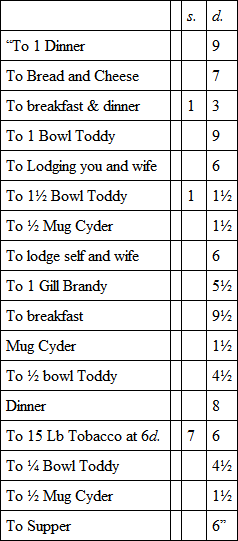
I suppose the quarter bowls of toddy were for Madam Tripp.
The house known for many years as the Ellery Tavern is still standing in Gloucester, Massachusetts, and is a very good example of the overhanging second story, as is shown in the front view of it given on page 79; and also of the lean-to, or sloping-roofed ell, which is shown by the picture on page 83 of the rear of the house. This house was built by Parson White in 1707, and afterward kept as a tavern by James Stevens till 1740; then it came into the hands of Landlord Ellery. As in scores of other taverns in other towns, the selectmen of the town held their meetings within its doors. There were five selectmen in 1744, and their annual salary for transacting the town’s business was five dollars apiece. The tavern charges, however, for their entertainment amounted to £30, old tenor. It is not surprising, therefore, to read in the town records of the following year that the citizens voted the selectmen a salary of £5, old tenor, apiece, and “to find themselves.” Nevertheless, in 1749, there was another bill from the Ellery Tavern of £78, old tenor, for the selectmen who had been sworn in the year previously and thus welcomed, “Expense for selectmen and Licker, £3. 18s.” The Ellery Tavern has seen many another meeting of good cheer since those days.
The selectmen of the town of Cambridge, Massachusetts, met at the Blue Anchor Tavern, which was established as an ordinary as early as 1652. Their bill for 1769 runs thus: —
“The Selectmen of the Town of Cambridge to Ebenezer Bradish, Dr. 1769:
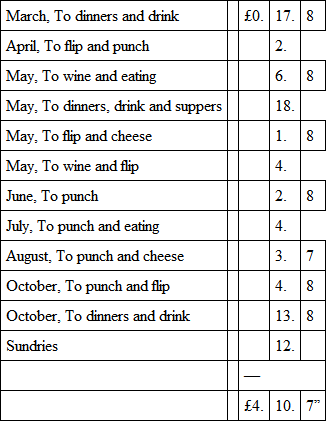
“Ordination Day” was almost as great a day for the tavern as for the meeting-house. The visiting ministers who came to assist at the religious service of ordination of a new minister were usually entertained at the tavern. Often a specially good beer was brewed called “ordination beer,” and in Connecticut an “ordination ball” was given at the tavern – this with the sanction of the parsons. The bills for entertaining the visitors, for the dinner and lodging at the local taverns, are in many cases preserved. One of the most characteristic was at a Hartford ordination. It runs: —




